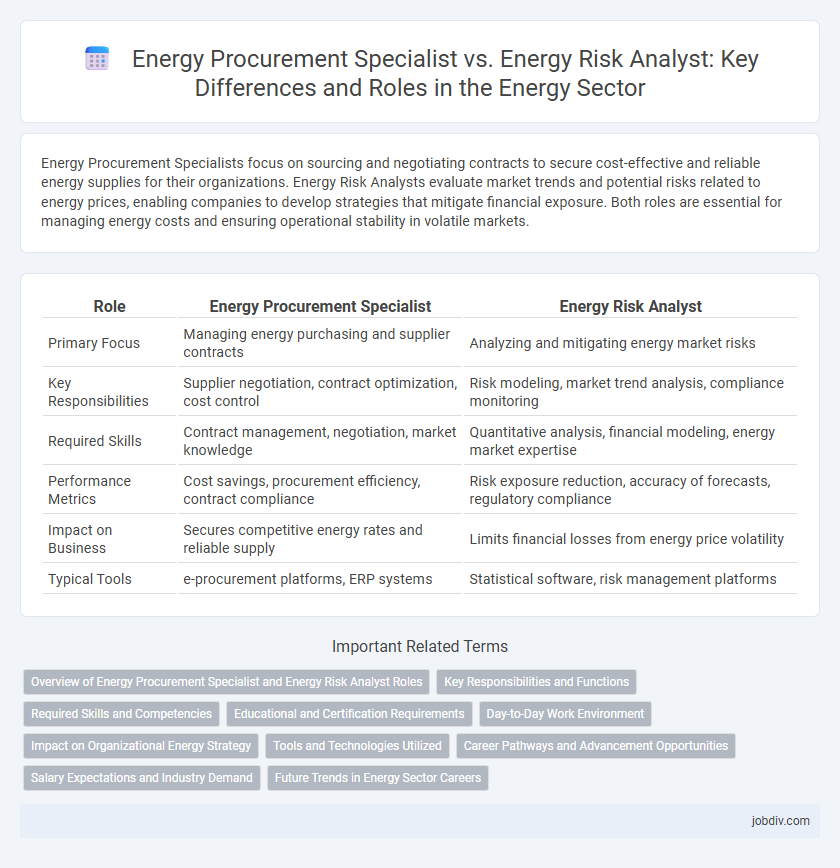Energy Procurement Specialists focus on sourcing and negotiating contracts to secure cost-effective and reliable energy supplies for their organizations. Energy Risk Analysts evaluate market trends and potential risks related to energy prices, enabling companies to develop strategies that mitigate financial exposure. Both roles are essential for managing energy costs and ensuring operational stability in volatile markets.
Table of Comparison
| Role | Energy Procurement Specialist | Energy Risk Analyst |
|---|---|---|
| Primary Focus | Managing energy purchasing and supplier contracts | Analyzing and mitigating energy market risks |
| Key Responsibilities | Supplier negotiation, contract optimization, cost control | Risk modeling, market trend analysis, compliance monitoring |
| Required Skills | Contract management, negotiation, market knowledge | Quantitative analysis, financial modeling, energy market expertise |
| Performance Metrics | Cost savings, procurement efficiency, contract compliance | Risk exposure reduction, accuracy of forecasts, regulatory compliance |
| Impact on Business | Secures competitive energy rates and reliable supply | Limits financial losses from energy price volatility |
| Typical Tools | e-procurement platforms, ERP systems | Statistical software, risk management platforms |
Overview of Energy Procurement Specialist and Energy Risk Analyst Roles
Energy Procurement Specialists are responsible for sourcing and securing energy supplies at competitive prices, managing supplier relationships, and ensuring compliance with regulatory frameworks to optimize cost-efficiency and reliability. Energy Risk Analysts focus on identifying, assessing, and mitigating financial risks associated with energy market fluctuations, utilizing quantitative models and market data to forecast price trends and volatility. Both roles are critical for balancing cost management and risk exposure in energy companies, contributing to strategic decision-making and operational stability.
Key Responsibilities and Functions
Energy Procurement Specialists manage supplier relationships, negotiate contracts, and secure cost-effective energy supply agreements to optimize procurement strategies. Energy Risk Analysts analyze market trends, assess exposure to price volatility, and implement risk mitigation models to safeguard financial stability. Both roles demand expertise in energy markets but focus respectively on acquisition efficiency and risk assessment.
Required Skills and Competencies
Energy Procurement Specialists require strong negotiation skills, market analysis expertise, and supplier relationship management to effectively secure energy contracts at competitive rates. Energy Risk Analysts need advanced quantitative skills, proficiency in risk assessment models, and the ability to interpret complex market data to identify and mitigate potential financial risks. Both roles demand a deep understanding of energy markets, regulatory frameworks, and strategic decision-making capabilities.
Educational and Certification Requirements
Energy Procurement Specialists typically hold a bachelor's degree in energy management, business, or engineering, with certifications such as Certified Energy Procurement Professional (CEP) enhancing their credentials. Energy Risk Analysts often require a background in finance, economics, or energy studies, holding certifications like Financial Risk Manager (FRM) or Energy Risk Professional (ERP) to demonstrate expertise in risk assessment and mitigation. Both roles benefit from advanced knowledge of market regulations, contract negotiation, and data analysis, but prioritize certifications aligned with their specific focus area.
Day-to-Day Work Environment
Energy Procurement Specialists manage supplier relationships, negotiate contracts, and ensure efficient sourcing of energy commodities to meet organizational demand. Energy Risk Analysts analyze market trends, assess financial risks related to energy price fluctuations, and develop mitigation strategies to protect company assets. Both roles require strong analytical skills, but Procurement Specialists focus more on contract execution and supply chain coordination, while Risk Analysts prioritize data modeling and risk assessment.
Impact on Organizational Energy Strategy
An Energy Procurement Specialist directly influences organizational energy strategy by securing cost-effective and sustainable energy contracts that align with the company's operational needs and budget constraints. An Energy Risk Analyst enhances strategic decision-making by identifying, quantifying, and mitigating energy market risks, ensuring financial stability and regulatory compliance. Together, they optimize energy procurement decisions and risk management, driving a resilient and adaptive energy strategy for the organization.
Tools and Technologies Utilized
Energy Procurement Specialists leverage contract management software, market intelligence platforms, and e-sourcing tools to negotiate and secure optimal energy supply deals. Energy Risk Analysts utilize advanced analytics software, risk modeling platforms, and real-time data visualization tools to assess market volatility and forecast energy price fluctuations. Both roles increasingly adopt AI-driven insights and blockchain technology to enhance transparency and decision-making accuracy in energy markets.
Career Pathways and Advancement Opportunities
Energy Procurement Specialists focus on sourcing and negotiating contracts for electricity, natural gas, and renewable energy, advancing toward senior procurement or supply chain management roles. Energy Risk Analysts specialize in identifying and mitigating financial risks related to energy markets, with career progression leading to risk management director or chief risk officer positions. Both roles offer pathways into strategic leadership within energy companies, emphasizing expertise in market dynamics and regulatory compliance.
Salary Expectations and Industry Demand
Energy Procurement Specialists typically earn between $70,000 and $100,000 annually, driven by their role in negotiating energy contracts and managing supplier relationships. Energy Risk Analysts command slightly higher salaries, often ranging from $80,000 to $110,000, due to their expertise in assessing market volatility and mitigating financial risks in energy trading. Industry demand for Energy Risk Analysts is growing rapidly within utilities and energy trading firms, while Energy Procurement Specialists remain essential in corporate energy management and infrastructure sectors.
Future Trends in Energy Sector Careers
Energy Procurement Specialists will increasingly leverage AI-driven platforms to optimize sourcing strategies and secure sustainable, cost-effective energy contracts amid volatile markets. Energy Risk Analysts are expected to utilize advanced predictive analytics and blockchain technology to enhance risk assessment and compliance in evolving regulatory landscapes. Both roles will demand deep expertise in renewable energy integration and carbon management to support corporate sustainability goals in the future energy sector.
Energy Procurement Specialist vs Energy Risk Analyst Infographic

 jobdiv.com
jobdiv.com